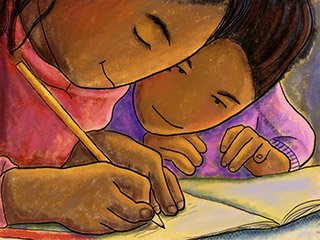Making friends and learning
At age six, your child will use language for learning, and this is an important aspect of language development. You need to consider that children who have been supported with oral communication activities (listening and talking) are more likely to become good readers and more proficient at writing. Until now you may have read stories to your child at bed time. Now you will need to read with your child their school books and support learning.
WHAT YOU CAN DO AND LOOK OUT FOR
- Provide opportunities for your child to converse about things and events that matter to him/her. The school life is always a good topic to converse.
Notice they have more refined language skills and can engage in interesting conversations full of details.
- Engage in purposeful conversations including the use of verbs in present, past and future tenses.
You should gladly notice they can speak clearly and use grammatical rules accurately and that often mistakes made in previous years have now gone and that their vocabulary has increased rapidly.
- Find the time to talk with your child about the school day what he/she has done in the school during the day. Check the school books and ask you child about subject he/she has learnt.
Notice their language moves beyond communications and provides the basis for learning contents and topics taught in the school.
- Visit your local library with your child. As far as possible provide your 6 years old with age appropriate books.
Notice children age 6 begin to read independently and do so for amusement during own time, they enjoy stories with adventures and characters they can relate to.
- Provide opportunities for your 6 years old to answer the home phone and talk to people, family & friends.
Observe your 6 years old speaks in simple but complete sentences with five to seven words and follows a series of three commands in a row, which is enough, for example to take short messages: Tell mummy that I bought fun fair tickets, please, and pass them on.
- Engage in fun conversations with your child and allow him/her to tell you funny stories or just speak their mind.
Notice your 6 years old starts to see that some words have more than one meaning, and sounds out unfamiliar words and understands jokes and puns, and starts verbally expressing a sense of humour.


